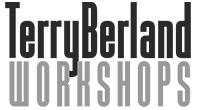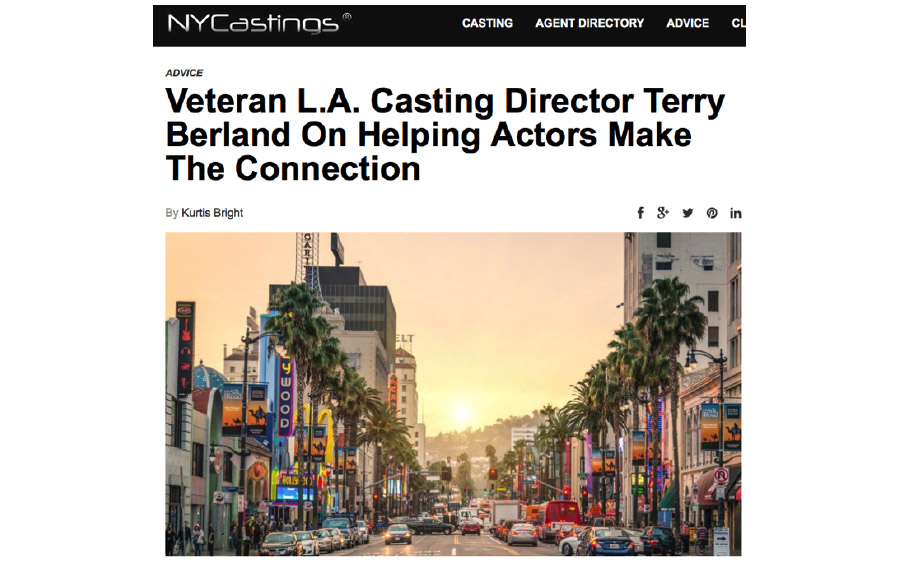Written by Kurtis Bright for NYCastings website
Most of the time, casting directors have very specific areas they focus on: commercial, film, or television, for instance. Especially when it comes to voiceover versus on-camera work, most CDs do one or other — rarely both.
But Terry Berland of Berland Casting in Los Angeles isn’t your typical casting director. A New Yorker born and bred, Berland got her start working in advertising on Madison Avenue, cutting her teeth casting both the actors to be used on camera in agency-produced spots, as well as those who would do the voiceover. By the time that kind of in-house commercial casting had started to decline, Berland had climbed to the top of the profession, heading up casting at Madison Avenue ad powerhouse BBDO Worldwide.
So it made perfect sense that she would continue casting commercials, opting to head out West to open up and partner in running the commercial division of Liberman Hirschfeld Casting for a time before opening her own shop. It also made sense that she would continue casting both voice and on-camera talent, as she has done for the past 25 years, and continues to do out of her Wilshire Boulevard offices.
When she’s not casting projects like “Invader Zim,” or “Whining Low,” Berland enjoys helping out actors by teaching high-quality classes and dispensing her accumulated wisdom from sitting behind the table in thousands of casting sessions through her book, “Breaking Into Commercials.”
She was kind enough to take some time out of her busy schedule to chat and offer some thoughts for actors.
On The Relationship Between Casting Directors And Actors:
Casting directors are only as good as the actors they bring in. So an actor needs to feel very much a part of the process, equal to the casting director. They should come in with the attitude: ‘I’m here to solve your problem. [I] have a creative choice, and it’s my way of solving your problem. Your problem is that you want to find the right person to make this character come alive.’ So maybe a big mistake is for an actor to walk into a casting and not feel like a part of the process. A big part of the process.
On The Similarities And Differences Between Voice And On-Camera Acting:
A similarity for the actors is you have to connect. And obviously there’s different techniques. There’s techniques for connecting on camera: for on-camera it’s like a short scene. For voiceover, you have to connect also, so that’s similar. The difference with voice acting is, because you’re only hearing the voice, the actor has to know how to subtly change things, and convey their message with a lot of nuances in their read. In on-camera you have the visual to help the message along, but with voiceover you only have your voice. There’s transitions in copy: maybe you start out bright, then there’s a discovery, then there’s an invitation to do something, and then a result. And that all has to come from nuances in your voice.
On Teaching:
I’ve been teaching for years. I love educating. I teach on-camera based on short scene study. Voice-over is based on fundamental acting techniques too. The method I use is proven; people book more, get more callbacks, get agents. So it’s very satisfying. We just have to be very, very clear, when we’re a casting director that they’re coming to learn from us, and they’re not coming to audition. It’s teaching. The rules that we follow to teach are very strict in Los Angeles.
On Giving A Good Audition:
Auditioning well is based on acting. The biggest mistake is not realizing they need to be an actor. Even when it comes to, ‘Slate your name and tell me something about yourself,’ it takes a certain way. In commercials, you need to look at that camera and be open and friendly and decide what you’re going to say with a personality. If its an improv they have to know how to do a commercial improv.
On Being Needy As An Actor:
There’s just so many different things that can go wrong when talent is in the room. I would say one big thing is they should know what they’re doing – they should be confident, yet friendly, not above it all, they should know what empowers them, and they should not come off as needy. Because when there are clients in the room, you’re with the very people that can book you. And some people behave in a very needy way. We can feel it, and it’s not attractive.
On Dealing With Mistakes In An Audition:
If you’re doing a commercial read, and you make a mistake, improv around your mistake and try to get back on track. One of the worst things to do is to apologize and be down on yourself and make it a big tragedy that you made a mistake. Someone that’s really trained, in a fun way will try to improv around their mistake, and then either they get back on track or they don’t. A mistake can actually be a little gift. Knowing how to improv around that mistake can be a real gift.
On Crossing Lines:
When it’s a callback don’t cross a line figuratively or literally. You wanna stay on the mark that you’re given, and don’t walk over to [the clients] and start shaking their hands and saying ‘It’s so nice to meet you!’
On Connecting With The Casting Team Without Being Needy:
The best way to make a connection is to be good at what you do. Be friendly, open, say hello. But you don’t want anything from them. Don’t be attached to getting the job. The best actors go in, they do the best work they can, they’re well-trained, they know they did a good job, they leave, and forget about it, and go to the next one. And it’s an interesting dance, because of course you want the job. Let’s not pretend you don’t want the job. But you can’t have so much invested in that one particular job. Your job is to go in and give a good audition, and then the next one, and the next one.
On Being Neutral:
So I’d say another bad mistake actors make is they’re afraid to make strong choices, and they neutralize their audition choices. If you’re neutral you’re no place. You have to be distinct. We love when everybody’s good. I could have 25 actors come in and read for the same role and they’re all really good, they’re all just a little different. And then it’s subjective from the people who are choosing them, because the casting director doesn’t book them, it goes to the selection process.
On Choosing Where To Plant Your Flag As An Actor:
I would say go where you feel more comfortable, where you like the lifestyle. Good things are going to happen in [New York or L.A.], but the main thing is that you like the lifestyle initially. You should be happy with how you’re living, and where you’re living and then the right things will come to you. I know a lot of actors who do this: once they get started in one place, they then see thing more clearly and they reassess things and realize they want to live on the other coast because of their needs, their career needs, so they just make the switch. And say you start out in New York – there’s great training that’s really respected. Make sure you take full advantage of where you are. If you decide at a later time that you got everything you’re going to get out of that market, then you can always switch. But enrich your resume wherever you are.
If you want to sharpen up on your commercial acting technique, follow this link to Terry Berland’s Commercial Acting workshop.

